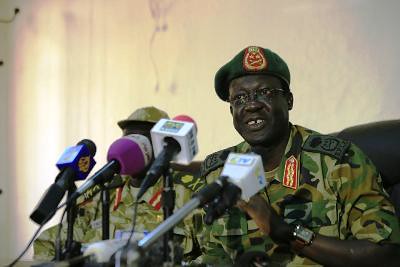
Chief of Staff of South Sudan's army, General James Hoth Mai speaks during a media update, with regards to the current fighting with rebels in north of the country, in Juba January 2, 2014., a photo by Pan-African News Wire File Photos on Flickr.
TUESDAY 4 FEBRUARY 2014
South Sudan army chief warns against military involvement in politics
February 3, 2014 (JUBA) - South Sudan’s army (SPLA) chief of general staff on Monday broke his silence on the six-week old conflict, warning the military against any involvement in the country’s political warfare.
General Hoth Mai said the army should always remain neutral and that their participation in the political violence, which started in mid-December after a dispute among the presidential guards, increased threats of an all-out civil war.
He also warned the country’s politicians to avoid uttering inflammatory statements that could invoke ethnic emotions and lead to further escalation of violence.
According to the International Crisis Group (ICG), an estimated 10,000 people have died in the conflict, which started in Juba and spread to Jonglei, Unity and Upper Niles states as the army engaged defectors and armed civilians.
The split in the military followed a battle for control of South Sudan’s ruling party (SPLM) between President Salva Kiir - a Dinka - and his former deputy Riek Machar - a Nuer, which intensified after Kiir sacked the latter in July last year.
Both sides have been accused of abuses and in some instances the fighting has taken on a ethnic dimension, despite political supporters of both men being from the various ethnic groups in the country.
General Mai, himself a Nuer, is a military veteran from over two decades of conflict between the SPLA and the Sudanese government for the right to secede. South Sudan may have achieved its independence more than two years ago, but many still view the SPLA as a liberation army with no political structures.
The head of the army, however, said some South Sudanese politicians failed to understand the suffering of the 740,000 people displaced by the conflict.
"I spent all my life in guerrilla wars to achieve independence. I’m not happy seeing people of South Sudan suffering, which is what I see. The politicians don’t see it," said Mai in statements on multiple social media and news websites.
He advised South Sudan government and its rebels groups to strike a political deal seeking an end to the conflict, which nearly turned into a full-blown civil war.
"The military cannot solve the political problem that needs to be solved politically," said the senior military officer.
"We have given room for the politicians to solve this issue to serve the country," he added, stressing the importance of dialogue among the country’s warring parties.
ADMITS ARMY HAS CHALLENGES
Meanwhile, Gen. Mai also admitted the army still had some challenges that needed to be dealt with as the young nation’s army transforms into a professional force.
"Yes we have a problem. The SPLA is composed of different militias most of whom haven’t gone through training. They’re from the village and they can’t read or write; they don’t know anything but loyalty to their local commander who identifies with them," said the ex-graduate of South Africa’s University of Fort Hare.
He, however, observed that it was better for the army to "stay outside the political equation", emphasising the neutral role national armies play in protecting the country’s sovereignty.
The top army general also admitted that atrocities were committed by both sides during the conflict, but denied allegations that government forces looted several medical facilities when recapturing towns under rebel control.
"We have heard such reports and so we decided to form a committee to investigate these allegations," Gen. Mai told Sudan Tribune last week.
This committee is still conducting the investigation whose findings will be made public after completing the assignment, he added.
CHURCH WANT ARMY REFORMS
Meanwhile, the various Church heads called “urgent” reforms among the country’s organised forces, especially the national army and police, is urgent.
“Our army has grown in size since the signing of the CPA and has become a significant cost to our nation, at the expense of investment in development priorities. It lacks cohesion. We are conscious of the need to address reconciliation within the armed forces themselves. There is no longer any place for personal militias,” their statement further reads.
“We believe our armed forces need urgent support and pastoral care. We also feel that our national army needs a new name, not associated with a single political party. A professional army should never be involved in politics,” it added.
Decrying the manner in which the youth were manipulated into the army, the church leaders called upon all armed groups, whether government or opposition, whether formal or informal, to respect international norms for armed conflict. Such aspects, they argued, should include respect for and protection of civilians, dignified treatment of prisoners of war, and refraining from extra-judicial killings.
“We insist on respect for institutions such as hospitals, churches and places where displaced civilians shelter,” they jointly advocated.
(ST)
No comments:
Post a Comment